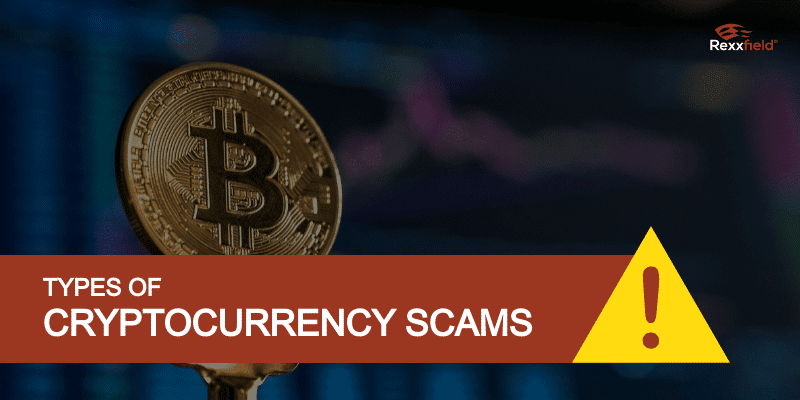The growing popularity of digital assets, like Bitcoin and other altcoins, brings higher risks for investors; particularly novices. In the last year complaints about cryptocurrency fraud and price manipulation on crypto exchanges have increased significantly. But it’s not just market manipulation that causes people and businesses to lose money. Several types of cryptocurrency scams target crypto users. Fortunately, most transactions are traceable.
Hackers compromise and empty digital wallets by targeting high-value wallets and using social engineering to exploit lapses in security. These hackers also obtain unauthorized access to administrative passwords and private keys through phishing scams.
Our crypto investigators have seen many very creative cryptocurrency scams in our Crypto-scam recovery units. They combine digital forensics with traditional investigative methods to combat online financial crime and cryptocurrency fraud. Below we listed some common types of cryptocurrency scams we encountered.
Key Points
- Cryptocurrencies offer tremendous investment opportunities but come with substantial risks.
- Beware of quick wealth promises.
- Perform due diligence and research any wallet, website, and other information available.
- Work with reputable and regulated exchanges.
List of Cryptocurrency Scams
Bitcoin mining scams
Cryptocurrencies like Bitcoin are created through mining, which requires a significant computational power to complete sophisticated algorithms to record transactions on the ledger. When ‘blocks’ are mined and added to the ‘chain’, the miner gets Bitcoins. Because this mining process takes time, power, resources, and infrastructure, scammers find people to invest in mining projects as a form of passive income.
Bitcoin wallet scams
Cryptocurrencies like Bitcoin are stored in digital wallets. Wallets have two keys, a private key and a public key. A public key is used to send money. The private key permits spending or sending cryptocurrency. Bitcoin wallet scams target people who are new to the cryptocurrency market. They will ask them to send their private key. Never share your private key!
Cryptocurrency Exchange Scams
When Bitcoin and other cryptocurrencies became tradable, there weren’t many exchange platforms. But not long after, many started popping up. However, these exchanges were not all legitimate. They appeared to be legitimate places to buy and sell cryptocurrency, but the owners would wait until many people deposited, and even traded meanwhile, and then pull the plug and take all the investments made on their platform.
Pump and Dump scams
Perhaps the most well-known crypto scam is the pump-and-dump scam.
Similar to stocks, pump-and-dump scams involve a scammer buying a large amount of altcoin and then promoting the coin on the internet, creating hype around the coin. Social media platforms are mostly used for these scams. Because of the created hype, people will start buying the coin which drives up the price (pump). Once the price spikes, the scammers sell (dump) and everyone else suffers losses because of the rapidly falling price.
Pyramid Schemes:
Pyramid schemes in the crypto market are similar to the Ponzi scheme in any market. The only difference is that the scammers capitalize on the growth of cryptocurrencies to promise victims quick wealth. A great example of a pyramid scheme is OneCoin.
ICO Scams
ICO (Initial Coin Offering) is similar to the IPO (Initial Public Offering) process but without the usual regulatory process. Between 2016 and 2018, the cryptocurrency market flooded with thousands of new altcoins that all promised to be the next Bitcoin or Ethereum. Some of these altcoins generated millions of investments, and when the price spiked, the owners sold. ICO scams are similar to pump-and-dump scams, with the difference being that ICO scams are exit scams.
High-Interest Return Scams
Growing in popularity are the high-interest return scams, particularly the decentralized finance (DeFi) space. Many legitimate platforms allow crypto users to deposit or stake multiple cryptocurrencies and reward them with a high-interest rate. Sometimes these regulated and legitimate projects even offer 10% to 15% interest for Bitcoin and Ethereum deposits. But beware of any offers higher than 15%, as there are many high-interest return scammers. Read the fine print and do your research.
Boiler Room Scams
Boiler room scams use cold calling and high-pressure sales techniques to lure in victims to invest. In most cases, these operations are done from low-cost office spaces (boiler rooms), full of telemarketers, who are incentivized by commissions. Of course, cryptocurrency boiler room scams don’t involve the same level of direct contact as traditional boiler room scams do. In most cases, the messaging is done through emails or postings on the internet, especially social media.
How to avoid cryptocurrency scams
The cryptocurrency market is the Wild West of speculation and investments. Because of its unregulated nature, it is crucial to work with a reputable and regulated currency platform. Some well-known, respected, and trusted platforms are Coinbase, Kraken, and Binance. When choosing a cryptocurrency exchange platform to buy and sell cryptocurrency, also make sure that your deposits are insured against theft or loss. Any reputable and legitimate exchange has insurance and stores digital wallets offline.
Besides using a trusted platform, there are other things you should do to avoid cryptocurrency scams.
- Due diligence: investigate every website and research the background of people in the cryptocurrency market.
- Avoid anything that seems vague or is unclear.
- Beware of quick wealth promises and flashy sales pitches.
- Work with trusted and regulated exchanges.
- Learn from experts or talk to your financial advisor before you invest any money in cryptocurrencies.
- If you plan on investing and holding certain cryptocurrencies over numerous years, consider obtaining a cold-storage hardware wallet, instead of leaving it on an exchange for a long period.
Get your money back as a victim of crypto scams.
If you fell for crypto scams, take comfort in knowing that many people have recovered their stolen cryptocurrency funds. Nothing is truly anonymous and crypto transactions can be traced.
We can help you recover your stolen funds. Start by filling out our case-intake form (obligation-free) and our cryptocurrency investigators will be in touch.


